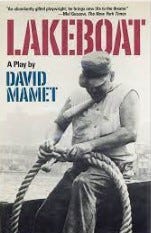The characters in David Mamet’s brilliant, semi-autobiographical play “Lakeboat” provide insight into their work by almost never directly talking about it. The play’s twenty-eight short scenes contain very little action, mimicking the often uneventful work days on a modern Laker. The color and variety missing from the sailors’ work becomes the stuff of their surreal conversations, which reel drunkenly from speculations on the nightcook’s mafia ties to World War II side arms, to how Italians drink Coke. Mamet skillfully creates interior lives that show men compensating for a work life that is both dangerous and dangerously boring.
Using his signature “sprung-rhythm wordplay—so close to its real-world source,” [1] Mamet serves up the poetry of common speech, creating a metrical realism for men who, as Great Lakes novelist Jay McCormick wrote, “were sometimes visited by the land” [2]. It’s as though Mamet put a tape recorder in a waterfront bar and let it run, the repetition and “dialogue-of-the-deaf philosophizing” [3] describes men who are desperately bored and paints a picture of work in where there are long stretches (too many) with nothing to do.
The few times they speak of their work directly, the characters do so with a mixture of embarrassment and honesty, but without a trace of irony:
When rookie seaman Dale Katzman questions the “Fireman” about his job he gets a testy, though honest reply: “Of course, I read a bit. I mean, when you get down to it. What is there to do? Watching two gauges for four hours at a clip? … If you don’t read, do something, you’d go insane.”
Veteran seaman Joe Litko gives kindly advice to Katzman, saying, without irony: “You’re okay and you’re a good worker. I don’t mean that disrespectfully.”
Ultimately, Mamet creates characters who, if not flawless, are wholly sympathetic. He imparts to them an almost desperate romanticism: their endurance of their work borders on the heroic.
[1] “That Poetry of Mamet, Aboard a Boat, Dammit,” A.O. Scott, New York Times, April 13, 2001.
[2] Jay McCormick, November Storm (Garden City, NY: Doubleday, Doran, and Company, 1943), 197.
[3] Scott.





